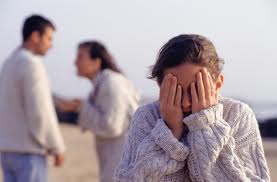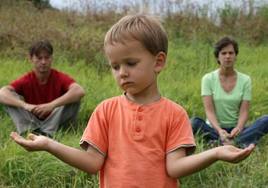 Poignant and funny stories from 3 kids — two girls and a boy, from 8 to 10 yrs old — who have witnessed their parents marriages dissolve in arguments and acrimony, watched dads stomp out, and moms throw pots. They’ve suffered broken hearts not only for their moms and dads, but themselves. Then they’ve gone through the tensions and challenges of staying with each parent and conflict continuing, of new romantic interests coming into their home, of worrying about whether this particular boyfriend is the best one for mom. All of them have working moms and worry when their mom or dad can’t find work or when dad doesn’t send alimony payments. With the wisdom of maturity they have worried about divided loyalties as new step-moms or stepdads enter the picture. And finally they’ve evolved some thoughtful ideas for themselves about family and relationships.
Poignant and funny stories from 3 kids — two girls and a boy, from 8 to 10 yrs old — who have witnessed their parents marriages dissolve in arguments and acrimony, watched dads stomp out, and moms throw pots. They’ve suffered broken hearts not only for their moms and dads, but themselves. Then they’ve gone through the tensions and challenges of staying with each parent and conflict continuing, of new romantic interests coming into their home, of worrying about whether this particular boyfriend is the best one for mom. All of them have working moms and worry when their mom or dad can’t find work or when dad doesn’t send alimony payments. With the wisdom of maturity they have worried about divided loyalties as new step-moms or stepdads enter the picture. And finally they’ve evolved some thoughtful ideas for themselves about family and relationships.
Produced in 1978 for NPR’s All Things Considered, this 11 min 30 sec feature was broadcast in the context of multiplying studies about divorce, the effects of divorce on kids, the rising phenomenon of working mothers, the shuttling of kids back and forth between moms and dads and societies concerns for all of this.
These kids are refreshingly candid about their feelings, their worries about their parents and their reactions to new adults coming into their intimate orbit.
“It’s not fair for them (that they divorced). Why? “Because they need each other”
“I found my father was seeing another woman besides my mother and I thought this would really change me.”
“My mother has a lot of male friends. They’re all really nice. You can depend on them.” How do you depend on them? “Well when my mom’s friend Philip was having a party and I was sick and a bit frightened to be left in the apartment, he left his own party and came over to see me.”
“I just want my mom to get a man who will be good to her.”
“When I grow up I want to live with a man — not get married — and let them be a little free. To have woman friends, not girlfriends.”
These kids are amazing. They are so articulate and somehow able to talk freely about the most delicate subjects. I’m impressed!
PS What a great idea for a radio piece. It should be done more often, and with kids of different races and classes.